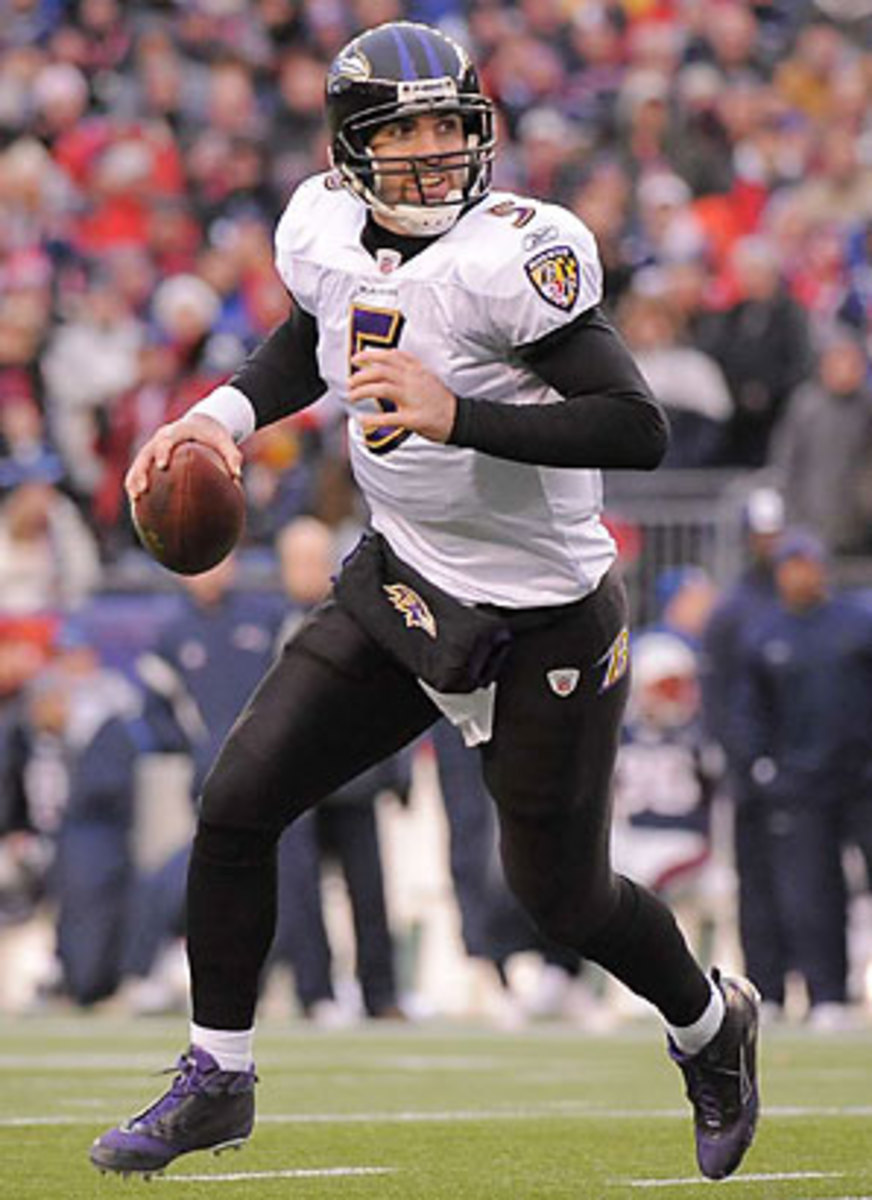
Pass interference penalties hide number of underrated fantasy stars
We've all experienced the feelings of disappointment, anger and dismay when a big play, especially one in crunch time, is called back by a penalty. Even worse than a crucial play being called back, is one that still moves the offense due to defensive pass interference. The team gets the yardage but your fantasy player, whether quarterback, receiver or both, comes up empty on the stats sheet. Since some defender couldn't correctly do his job you get cheated out of valuable points. You would think that the yardage lost by penalty would be negligible and spread pretty equally among the league's hundreds of skill players, but based on a study conducted on the penalty data collected after the 2011 season, some players were more victimized than others.
No quarterback was the victim of the officials' yellow laundry more in 2011 than the Ravens' fifth-year starter, Joe Flacco. Instead of enjoying the best passing yardage season of his career and continuing his fourth-straight season of improvement, Flacco's 3,610 yards was his second-lowest total (although still within 12 yards of his best and second-best). Missing from his numbers were the 244 yards lost to defensive pass interference calls that would've netted him him a total of 3,854 yards, second-most in franchise history. Once again, that lost yardage was credited to the team in terms of penalty yardage but neither Flacco nor his intended receiver got anything. In fact, 160 of those forgotten yards can be accounted for on just three plays, a 60-yard and pair of 50-yard bombs to speedster and 2012 fantasy breakout candidate, Torrey Smith, who finished 2011 with 841 yards. Add in the gains lost (but really earned by both he and Flacco), and lo and behold, Smith becomes a 1,012-yard receiver for the year and much higher on the fantasy value totem pole.
Smith is just one example of a number of wide receivers who lost at least one game's worth of productivity to defensive pass interference. His Baltimore teammate Anquan Boldin was victimized six times for 73 yards.
Also hit hard was another AFC North wideout, Cincinnati's A.J. Green. Just think of how great his first year would've been had the 152 yards on six catches that were stolen from him by defensive infractions counted. As it was, Green's 1,057 yards and 65 catches ranked sixth and 20th, respectively, among all rookies in NFL history. Adjusted for the lost catches, his 1,209 yards would've ranked third behind only Boldin (1,377 for the Cardinals in 2003) and Randy Moss (1,313 for the Vikings in 1998) among rookies.
Then there's the much-maligned Santonio Holmes of the Jets, who had just 51 catches for 654 yards in a career-worst season. But a closer examination of what happened shows that Holmes lost 103 yards on six catches, not to mention a 23-yard touchdown called back against the Chargers in Week 7 as a result of one of only two offensive holding penalties called on New York's Pro Bowl center Nick Mangold.
Holding like Mangold's was responsible for a slew of lost touchdowns, but a solid argument can be made in most cases that the hold called made the pass play possible by buying the quarterback enough time to throw. Don't try explaining that to Robert Meachem, now of the Chargers, but then of the Saints, who lost not one, but two scores due to his teammate's grabbing. On the first, fullback Jed Collins was called for holding while protecting Drew Brees, costing Meachem a 40-yard score against the Vikings in Minnesota during the pivotal fantasy playoff Week 15, meaning that many fantasy seasons were won and lost on that single 10-point (or 11 in PPR league) play. The second was a 10-yard score lost on a hold by three-time All Pro right guard Jahri Evans, but since it came in Week 17, it had little effect on fantasy scoring.
First and foremost, going into this fantasy season certain players appear more valuable than their numbers show. They were able to get open or hit receivers more times than you think and without the interference against them, would've had more catches/completions and receiving/passing yards than they've been credited with. Second, perhaps it's time for the NFL's stats to reflect these yards earned. There are rules changes all the time in sports that affect the numbers. Sacrifice flies and saves weren't original parts of official scoring in baseball. And earned run average takes into account plays that aren't the pitcher's fault. The NBA did away with the three-to-make two bonus free throws and changed the definition of an offensive charge. The NFL added overtime losses, forever changing how team points work. So why can't the NFL award yards to the players who earned them? It won't affect the game's outcome in any way, but including these plays in the individuals' stats lines would more closely reflect who was responsible for his team's gains.





